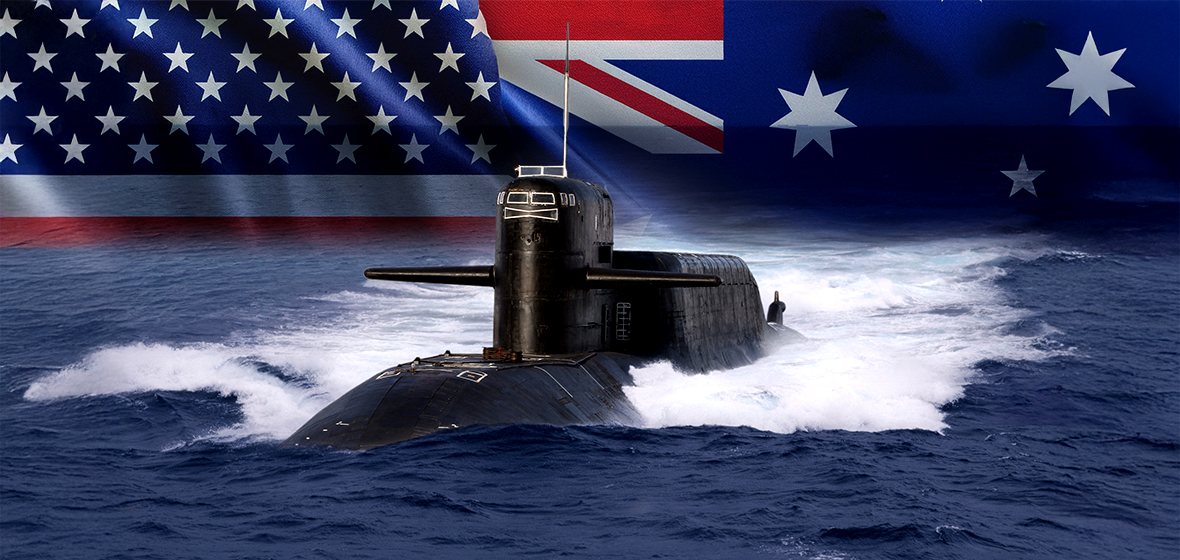Former Prime Minister Paul Keating doesn’t mince words. “This government has sold out to the United States,” he told the Daily Telegraph in reference to AUKUS, the partnership between Australia, the United Kingdom and United States of America. It’s been controversial from day one, despite enjoying bipartisan support in all three countries. Keating and fellow former PM Malcolm Turnbull probably agree on little, but this is a notable exception. “AUKUS is a terrible deal”, said Turnbull, who doubted the deal would achieve its key aim. “The most likely outcome of the AUKUS pillar one is that we will end up with no submarines of our own.”
Critics of the deal have called for the Albanese government to review Australia’s position and consider leaving, but others say breaking the agreement would be more damaging to Australia’s geopolitical position in the region.
Agreed by then Australian Prime Minister Scott Morrison, U.S. President Joe Biden, and U.K. Prime Minister Boris Johnson, in September 2021, AUKUS followed a bitter rupture between Australia and France over a $90 billion submarine contract. Australia agreed to purchase three nuclear-powered Virginia-class submarines from the US, in a deal expected to cost over $300 billion, until 2075. However, the delivery of the submarines is subject to approval from the American Senate, and as many experts pointed out, Australia risks paying for submarines that won’t be delivered.
One of the most controversial aspects of the agreement is that US the can choose not to deliver the submarines if its Senate deems it still hasn’t built enough for its own fleet. Mark Beeson, Adjunct Professor at the Australia-China Relations Institute at the University of Technology Sydney, points out that the US needs to build the submarines at a rate of 2.5 a year to meet its own and Australia’s demands, but it is currently only at 1.2 a year.
“I don’t think we got any guarantee that the Americans will live up to their part of the deal. And there’s absolutely nothing that we could do,” Beeson told the Journal.
Beeson, who supports leaving the agreement, hopes the current review by the US ends up being a way out of the arrangement. “[AUKUS] locks us into American strategic and foreign policy (…) for my lifetime,” he says. “Kurt Campbell, who was a senior advisor in the Obama Administration, has been widely quoted as saying (…) that Australia is kind of [on America’s] side, and we’ll do whatever we tell them to do, because they’ve got our gear and they can’t operate it without us helping them tell them how it all works.”
“There is an opportunity for Australia to play a serious, independent, even leadership role in the region”
Mark Beeson, adjunct professor, UTS
Budgets for these kinds of undertakings tend to balloon considerably, but Beeson is also worried that by the time the submarines are delivered (if they are delivered), advances in technology would have rendered them outdated. Beeson underwater drone technology could end up being capable of finding and destroying the submarines.
But his biggest concern comes from the current political status quo in the United States. Beeson reminds us of past armed conflicts escalated by the US that Australia joined – Vietnam, Iraq, Afghanistan, for example. “There is an opportunity for Australia to play a serious, independent, even leadership role in the region,” he says, a role undermined by the current political reality in the US.
Instead, Beeson believes Australia could enter a defence agreement with European countries, which he deems “reasonably sensible and reliable,” with whom we have more in common. He also points out the writings of Sam Roggeveen, from the Lowy Institute. In his book The Echidna Strategy, Roggeveen challenged the narrative that Australia is threatened by the rise of China.
“Nobody’s planning to invade [Australia], but it’s impossible to imagine not having some defence spending and acquisition,” Beeson continues.
“I think we are the safest country in the world [because] we have these natural advantages. It’s not that difficult to defend Australia from realistic threats.”
Beeson thinks six submarines wouldn’t make much difference in defending Australian sea lanes. “So why waste money on doing things we can’t do?” He prefers to focus on stronger diplomatic ties with our neighbours, especially Indonesia, and more sensible spending. But the focus of his critique is on the perceived target of AUKUS – China’s growing hegemony in the area.
Beeson admits that China’s increase in military spending is a concern, but part of it comes as a response to foreign powers (including AUKUS). When he questioned people privately about China’s expansion during a recent visit to the country, the answer was simply that this is what great powers like America do and it is important if China wants to keep pace with America. “They want to be respected and taken seriously,” says Beeson.
Since AUKUS, the relationship between Australia and China has been tested. Beijing criticised the agreement, with its minister of foreign affairs saying, “The Asia-Pacific is not a battlefield for geopolitical contests and does not welcome the Cold-War mentality and bloc confrontation.”
Beeson says, “If we’d establish a good relationship with China, as some of our neighbours have done, it might not be the end of the world either.” He argues there are good reasons for China to assert itself as a powerful influence in the region, and Australia establishing a good diplomatic relationship could see it play a more constructive role in the region.
In an article published in the Australian Journal of International Affairs, Beeson addresses his concerns about how an agreement like AUKUS can change the diplomatic landscape in the Asia-Pacific region. “By prioritising strategic ties with the USA over all other foreign and strategic priorities, Australian elites necessarily relegate the relationship with China to a second order issue, despite the People’s Republic being our chief trade partner and an increasingly consequential presence in the region.”
“As neighbours in the ASEAN grouping ought to remind us, we don’t have to choose between the increasingly belligerent great powers. On the contrary, it is possible to argue —somewhat quixotically, no doubt—that the region’s middle powers might form a like-minded coalition to encourage responsible behaviour on the part of their greater counterparts.”
“If every side of this global conflict possibility is prepared, then there is no conflict because no one wants war”
John Blaxland, historian, ANU
At the opposite end of the spectrum on this issue is John Blaxland, historian, ANU professor and former Australian Army Officer. “[AUKUS] is not about war,” he tells the Journal. “In fact, it’s about everything but war.”
Blaxland argues that leaving the agreement isn’t in Australia’s interests for technical and political reasons. On the technical side, the current diesel submarine fleet is outdated. He points out that to travel from Perth, where the submarines are stationed, to any other port, the vessels have to ‘snort’ a dozen times. Snorting, also known as snorkelling, involves a submarine raising its air induction mast, while submerged. It makes the submarine more detectable. Blaxland says in the past, the current requirements involved a manageable risk but this is less the case now, due to modern satellite and drone technology. He points out that other countries don’t have Australia’s size and can travel from port to port in their Exclusive Economic Zone easily without snorting so many times.
“Forget South China Sea, just to navigate our own exclusive economic zone (…), you can’t do it with diesels,” Blaxland says. “The only way to stay stealthy, operating out of Perth or a distance to get to another port, let alone go abroad, is to stay underwater, and the only way to do that realistically is with nuclear propulsion.”
Then there’s the political side. Three years after signing the deal, and with half a billion dollars already spent, getting out would send the wrong message to Australia’s neighbours and allies, according to Blaxland. “What does that say to the United States? What does it say to China? What does it say to the neighbours? What does it say to Indonesia? What does it say to all the others?”
“It says Australia is walking away from the United States. Australia is the leading engagement partner with the United States in the Indo-Pacific; other than Japan, this would have a catastrophic effect on resolve.”
Blaxland’s point is that a strong defence is a deterrent to war. The $368 billion bill sounds high now, but the ramifications of being involved in an armed conflict would be much more. The threat is already here but is not a conventional military challenge. “It’s not about what you do if there’s a war, we’re trying to prevent the war from happening in the first place,” he says. “If every side of this global conflict possibility is prepared, then there is no conflict because no one wants war.”
There is still support from both the American and British governments, even if the current American administration has raised concerns. Blaxland takes note of the common interests between Australia and the US, both English-speaking, new world, federal, bicameral, constitutional, free market, liberal, Pacific-facing democracies. The presence and engagement of the United States in the Pacific benefit Australian geopolitical interests. Stepping away from this partnership would allow the US to reduce its engagement the region, according to Blaxland.
In a recent article for the Conversation, Blaxland addresses the ongoing review in the United States, headed by US Under-Secretary of Defence for Policy, Elbridge Colby., The first phase of the agreement (called Pillar I), has been criticised by Colby. This is the phase meant to deliver submarines to Australia by the early 2030s. Colby is why AUKUS-sceptics are holding on for the end of the agreement, but Blaxland doesn’t see that happening. “Colby has made very clear the US needs to muscle up to push back and deter China’s potential aggression in the region. In that equation, submarines are crucial, as is a substantial submarine base in the Indian Ocean,” he writes.
And finally, there’s the diplomatic side. Australia has gone through several years of negotiations, and an already complicated and controversial broken agreement with France. The risk of not receiving the submarines exists because the Americans may not build fast enough to fill their quotas, but this is the deal that was made, whether we approve of it or not, and going back on it makes Australia come across as an unreliable partner. “We can’t undo what happened”, Blaxland says. “Time [for debating] has passed.”




